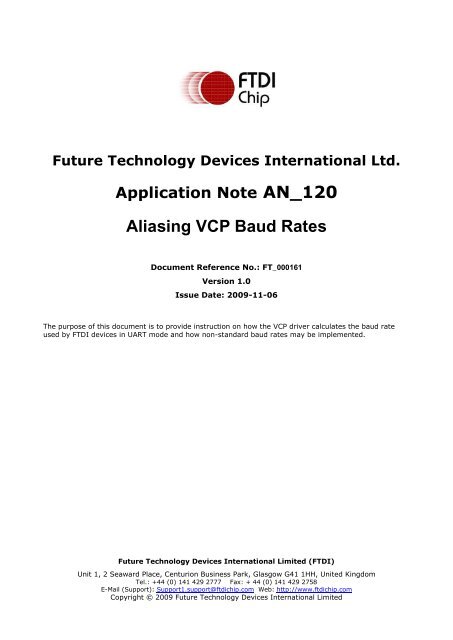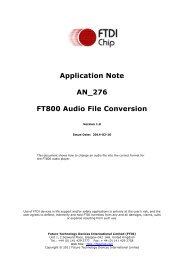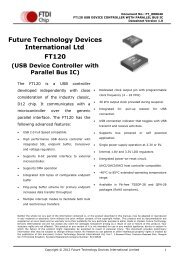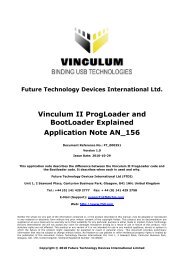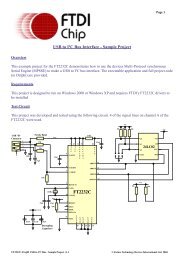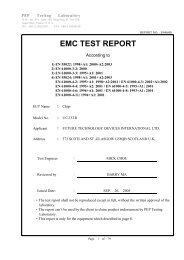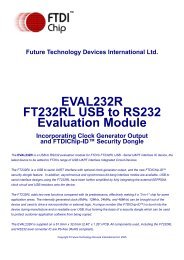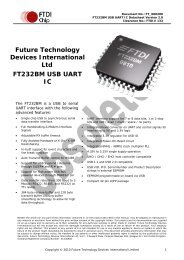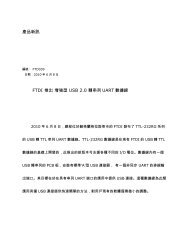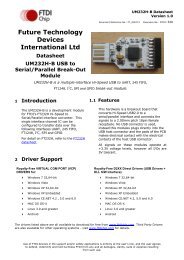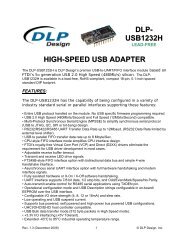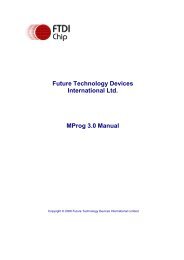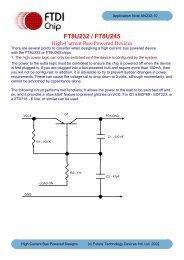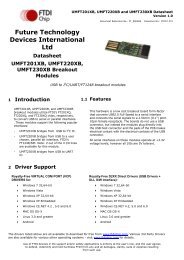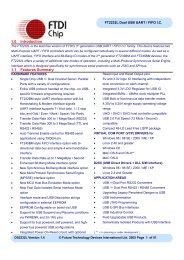Create successful ePaper yourself
Turn your PDF publications into a flip-book with our unique Google optimized e-Paper software.
Future Technology Devices International Ltd.<br />
Application Note AN_120<br />
<strong>Aliasing</strong> <strong>VCP</strong> <strong>Baud</strong> <strong>Rates</strong><br />
Document Reference No.: FT_000161<br />
Version 1.0<br />
Issue Date: 2009-11-06<br />
The purpose of this document is to provide instruction on how the <strong>VCP</strong> driver calculates the baud rate<br />
used by <strong>FTDI</strong> devices in UART mode and how non-standard baud rates may be implemented.<br />
Future Technology Devices International Limited (<strong>FTDI</strong>)<br />
Unit 1, 2 Seaward Place, Centurion Business Park, Glasgow G41 1HH, United Kingdom<br />
Tel.: +44 (0) 141 429 2777 Fax: + 44 (0) 141 429 2758<br />
E-Mail (Support): Support1.support@ftdichip.com Web: http://www.ftdichip.com<br />
Copyright © 2009 Future Technology Devices International Limited
Table of Contents<br />
Document Reference No.: FT_000161<br />
<strong>Aliasing</strong> <strong>VCP</strong> <strong>Baud</strong> <strong>Rates</strong> Application Note AN_120<br />
Version 1.0<br />
Clearance No.: <strong>FTDI</strong># 122<br />
1 Introduction .................................................................... 2<br />
2 Setting the <strong>Baud</strong> Rate ..................................................... 3<br />
3 <strong>Baud</strong> Rate Calculation ..................................................... 4<br />
4 <strong>Aliasing</strong> <strong>Baud</strong> <strong>Rates</strong> ........................................................ 5<br />
4.1 <strong>Aliasing</strong> ..................................................................................... 5<br />
4.2 <strong>Aliasing</strong> Using the Original Sub-Integer Divisors ...................... 6<br />
4.3 <strong>Aliasing</strong> Using the Additional Sub-Integer Divisors ................... 8<br />
4.4 <strong>Aliasing</strong> the FT2232H and FT4232H for <strong>Baud</strong> <strong>Rates</strong> upto<br />
12M<strong>Baud</strong> ......................................................................................... 10<br />
5 Contact Information ...................................................... 12<br />
Appendix A – <strong>FTDI</strong>PORT.INF Example ................................ 14<br />
Appendix B – Revision History ........................................... 17<br />
Copyright © 2009 Future Technology Devices International Limited 1
1 Introduction<br />
Document Reference No.: FT_000161<br />
<strong>Aliasing</strong> <strong>VCP</strong> <strong>Baud</strong> <strong>Rates</strong> Application Note AN_120<br />
Version 1.0<br />
Clearance No.: <strong>FTDI</strong># 122<br />
One of the most basic operations with the FT2232H (UART mode), FT4232H (UART mode), FT232R,<br />
FT2232D (UART mode) and FT232B devices is setting a <strong>Baud</strong> rate. This application note describes the<br />
various ways that this can be done. It also describes how to use non-standard baud rates with <strong>FTDI</strong>'s<br />
USB-Serial IC devices, including a technique called 'aliasing' - where one <strong>Baud</strong> rate is substituted by the<br />
driver in place of another baud rate.<br />
The second generation FT232B USB UART IC added additional granularity to the divisor used to generate<br />
the device <strong>Baud</strong> rate. This allows a much larger number of baud rates to be used with the FT232B and<br />
subsequent devices when compared to its predecessor, the FT8U232AM.<br />
Copyright © 2009 Future Technology Devices International Limited 2
2 Setting the <strong>Baud</strong> Rate<br />
Document Reference No.: FT_000161<br />
<strong>Aliasing</strong> <strong>VCP</strong> <strong>Baud</strong> <strong>Rates</strong> Application Note AN_120<br />
Version 1.0<br />
Clearance No.: <strong>FTDI</strong># 122<br />
When using <strong>FTDI</strong> Virtual COM Port (<strong>VCP</strong>) drivers, the <strong>Baud</strong> rate can be set in the Device Manager or from<br />
an application. When the <strong>Baud</strong> rate is set from an application program it is done in exactly the same way<br />
as with a standard legacy Windows COM Port - by simply passing the required <strong>Baud</strong> rate to the port using<br />
the Windows VCOMM API calls or a COM Port library. Both standard and non-standard baud rates can be<br />
set in this manner.<br />
When using <strong>FTDI</strong>'s D2XX direct driver the function FT_Set<strong>Baud</strong>Rate can be used to set both standard and<br />
non-standard baud rates.<br />
If a non-standard <strong>Baud</strong> rate is required, the formulae in this application note can be used to determine if<br />
it is possible.<br />
If the required non-standard <strong>Baud</strong> rate is possible simply pass it to the driver as normal and the required<br />
divisor will be calculated by the driver. For D2XX there is no longer any need to use the function<br />
FT_SetDivisor, but it has been left in for backward compatibility.<br />
Copyright © 2009 Future Technology Devices International Limited 3
3 <strong>Baud</strong> Rate Calculation<br />
Document Reference No.: FT_000161<br />
<strong>Aliasing</strong> <strong>VCP</strong> <strong>Baud</strong> <strong>Rates</strong> Application Note AN_120<br />
Version 1.0<br />
Clearance No.: <strong>FTDI</strong># 122<br />
A <strong>Baud</strong> rate for the FT232R, FT2232 (UART mode) or FT232B is generated using the chips internal 48MHz<br />
clock. This is input to <strong>Baud</strong> rate generator circuitry where it is then divided by 16 and fed into a prescaler<br />
as a 3MHz reference clock. This 3MHz reference clock is then divided down to provide the required <strong>Baud</strong><br />
rate for the device's on chip UART. The value of the <strong>Baud</strong> rate divisor is an integer plus a sub-integer<br />
prescaler.<br />
This is also true for the FT2232H and FT4232H up to 3M<strong>Baud</strong>. For higher baud rates the reference clock is<br />
an internal 12MHz clock and will be discussed later in the document.<br />
The original FT8U232AM only allowed 3 sub-integer prescalers - 0.125, 0.25 or 0.5.<br />
The FT2232H (UART mode), FT4232H (UART mode), FT232R, FT2232 (UART mode) and FT232B support<br />
a further 4 additional sub-integer prescalers - 0.375, 0.625, 0.75, and 0.875.<br />
Thus, allowed values for the <strong>Baud</strong> rate divisor are:<br />
Divisor = n + 0, 0.125, 0.25, 0.375, 0.5, 0.625, 0.75, 0.875;<br />
where n is an integer between 2 and 16384 (214).<br />
Note: Divisor = 1 and Divisor = 0 are special cases. A divisor of 0 will give 3 M<strong>Baud</strong>, and a divisor of 1<br />
will give 2 M<strong>Baud</strong>. Sub-integer divisors between 0 and 2 are not allowed.<br />
Therefore the value of the divisor needed for a given <strong>Baud</strong> rate is found by dividing 3000000 by the<br />
required <strong>Baud</strong> rate.<br />
The exact <strong>Baud</strong> rate may not be achievable - however as long as the actual <strong>Baud</strong> rate used is within +/-<br />
3% of the required <strong>Baud</strong> rate then the link should function without errors. When a <strong>Baud</strong> rate is passed to<br />
the driver where the exact divisor required is not achievable the closest possible <strong>Baud</strong> rate divisor will be<br />
used as long as that divisor gives a <strong>Baud</strong> rate which is within +/- 3% of the <strong>Baud</strong> rate originally set.<br />
For example:<br />
A non-standard <strong>Baud</strong> rate of 490000 <strong>Baud</strong> is required.<br />
Required divisor = 3000000 / 490000 = 6.122<br />
The closest achievable divisor is 6.125, which gives a baud rate of 489795.9, which is well within the<br />
allowed +/- 3% margin of error. Therefore 490000 can be passed to the driver and the device will<br />
communicate without errors.<br />
Copyright © 2009 Future Technology Devices International Limited 4
4 <strong>Aliasing</strong> <strong>Baud</strong> <strong>Rates</strong><br />
4.1 <strong>Aliasing</strong><br />
Document Reference No.: FT_000161<br />
<strong>Aliasing</strong> <strong>VCP</strong> <strong>Baud</strong> <strong>Rates</strong> Application Note AN_120<br />
Version 1.0<br />
Clearance No.: <strong>FTDI</strong># 122<br />
The file <strong>FTDI</strong>PORT.INF contains entries that are used as the divisors for standard <strong>Baud</strong> rates. By changing<br />
these it is possible to alias standard <strong>Baud</strong> rates with non-standard values - for instance replacing<br />
115k<strong>Baud</strong> with 512k<strong>Baud</strong>. Users would then set up the devices to operate at 512k<strong>Baud</strong> by selecting<br />
115k<strong>Baud</strong> for the appropriate serial port.<br />
Copyright © 2009 Future Technology Devices International Limited 5
4.2 <strong>Aliasing</strong> Using the Original Sub-Integer Divisors<br />
Document Reference No.: FT_000161<br />
<strong>Aliasing</strong> <strong>VCP</strong> <strong>Baud</strong> <strong>Rates</strong> Application Note AN_120<br />
Version 1.0<br />
Clearance No.: <strong>FTDI</strong># 122<br />
The FtdiPort232.NT.HW.AddReg section of <strong>FTDI</strong>PORT.INF contains the ConfigData string and it is this<br />
string that controls the baud rate calculation.<br />
The <strong>FTDI</strong>PORT.inf file may be viewed and edited with any text editor e.g. WordPad.<br />
[FtdiPort232.NT.HW.AddReg]<br />
HKR,,ConfigData,1,01,00,3F,3F,10,27,88,13,C4,09,E2,04,71,02,38,41,9c,80,4E,C0,34,00,1A,00,0D,00,0<br />
6,40,03,80,00,00,d0,80<br />
Each field consists of a pair of bytes, ordered as follows: Byte0, Byte1. Bits 13 through 0 denote the<br />
integer divisor while bits 16, 15 and 14 denote the sub-integer divisor, as follows<br />
15,14 = 00 - sub-integer divisor = 0<br />
15,14 = 01 - sub-integer divisor = 0.5<br />
15,14 = 10 - sub-integer divisor = 0.25<br />
15,14 = 11 - sub-integer divisor = 0.125<br />
The divisor can be extracted for each entry in a few simple steps, as shown here for the entry 9c,80<br />
Step 1 - re-order the bytes: 9c,80 => 809c Hex<br />
Step 2 - extract the sub-integer divisor; 15 = 1, 14 = 0 => sub-integer = 0.25<br />
Step 3 - extract the integer divisor: 13:0 = 009c Hex = 156 Dec<br />
Step 4 - combine the integer and sub-integer divisors: 156.25 Dec<br />
Step 5 - divide 3000000 by the divisor=> 3000000/156.25 = 19,200 baud<br />
The following lists the standard values and their respective baud rates<br />
10,27 => divisor = 10000, rate = 300<br />
88,13 => divisor = 5000, rate = 600<br />
C4,09 => divisor = 2500, rate = 1200<br />
E2,04 => divisor = 1250, rate = 2,400<br />
71,02 => divisor = 625, rate = 4,800<br />
38,41 => divisor = 312.5, rate = 9,600<br />
9C,80 => divisor = 156, rate = 19,230<br />
4E,C0 => divisor = 78, rate = 38,461<br />
34,00 => divisor = 52, rate = 57,692<br />
1A,00 => divisor = 26, rate = 115,384<br />
0D,00 => divisor = 13, rate = 230,769<br />
06,40 => divisor = 6.5, rate = 461,538<br />
03,80 => divisor = 3.25, rate = 923,076<br />
00,00 => RESERVED<br />
D0,80 => divisor = 208.25, rate = 14406<br />
To alias a baud rate of 920k baud to the standard 56k baud menu option under windows:<br />
- change the 34,00 entry to 03,80 (simple as both of the values are available from the previous list)<br />
To alias a rate of 197k baud to the standard 4,800 baud menu option under windows:<br />
- find the best divisor, check that it is sufficiently accurate and then modify the appropriate INF file<br />
entry.<br />
3,000,000/197,000 = 15.228. The best divisor is 15.25.<br />
3,000,000/15.25 = 196,721.<br />
196,721/197,000 = 99.8%.<br />
This is well within the required 3% tolerance.<br />
Set bit 15:14 to 10 for a sub-integer divisor of 0.25, and the lower bits to 0F.<br />
Copyright © 2009 Future Technology Devices International Limited 6
- replace the 71,02 entry with 0F,80.<br />
Incorporating these two changes the <strong>FTDI</strong>PORT.INF entry becomes<br />
Document Reference No.: FT_000161<br />
<strong>Aliasing</strong> <strong>VCP</strong> <strong>Baud</strong> <strong>Rates</strong> Application Note AN_120<br />
Version 1.0<br />
Clearance No.: <strong>FTDI</strong># 122<br />
[FtdiPort232.NT.HW.AddReg]<br />
HKR,,ConfigData,1,01,00,3F,3F,10,27,88,13,C4,09,E2,04,0F,80,38,41,9C,80,4E,C0,03,80,1A,00,0<br />
D,00,06,40,03,80,00,00,00,00<br />
Copyright © 2009 Future Technology Devices International Limited 7
4.3 <strong>Aliasing</strong> Using the Additional Sub-Integer Divisors<br />
Document Reference No.: FT_000161<br />
<strong>Aliasing</strong> <strong>VCP</strong> <strong>Baud</strong> <strong>Rates</strong> Application Note AN_120<br />
Version 1.0<br />
Clearance No.: <strong>FTDI</strong># 122<br />
The standard <strong>FTDI</strong>PORT.INF ConfigData <strong>Baud</strong> rate table only supports the original FT8U232AM<br />
sub-integer prescalers and not the new ones added for the FT232B and subsequent devices. To allow the<br />
addition sub- integer prescalers to be used when aliasing a <strong>Baud</strong> rate the following ConfigData entry is<br />
needed:<br />
[FtdiPort232.NT.HW.AddReg]<br />
HKR,,ConfigData,1,11,00,3F,3F,10,27,00,00,88,13,00,00,C4,09,00,00,E2,04,00,00,71,02,00,00,38,<br />
41,00,00,9C,80,00,00,4E,C0,00,00,34,00,00,00,1A,00,00,00,0D,00,00,00,06,40,00,00,03,80,00,00,<br />
00,00,00,00,D0,80,00,00<br />
(Note - The current ftdiport.inf file contains both formats for the config data string. You select/disable the<br />
correct string by using a ; at the start of the line to comment out the one you do not want. Only one<br />
entry for Config Data should be used.)<br />
In this case each field consists of 4 bytes, ordered as follows: Byte0, Byte1, Byte2, Byte3. Bits 13<br />
through 0 denote the integer divisor while bits 16, 15 and 14 denote the sub-integer divisor, as<br />
follows:<br />
16,15,14 = 000 - sub-integer divisor = 0<br />
16,15,14 = 001 - sub-integer divisor = 0.5<br />
16,15,14 = 010 - sub-integer divisor = 0.25<br />
16,15,14 = 011 - sub-integer divisor = 0.125<br />
16,15,14 = 100 - sub-integer divisor = 0.375<br />
16,15,14 = 101 - sub-integer divisor = 0.625<br />
16,15,14 = 110 - sub-integer divisor = 0.75<br />
16,15,14 = 111 - sub-integer divisor = 0.875<br />
Note that this ConfigData entry is the same as before except that each field consists of 4 bytes<br />
instead of 2 bytes. The first highlighted byte in ConfigData is the Flags byte and format of the fields<br />
is determined by Bit4 of the Flags byte. In the example above, setting Flags byte to 11 means that<br />
Bit4 is set and 4 byte fields are being used.<br />
The divisor can be extracted for each entry in a few simple steps, as shown here for the entry<br />
35,40,01,00<br />
Step 1 - re-order the bytes: 35,40,01,00 => 00014035 Hex<br />
Step 2 - extract the sub-integer divisor; 16 = 1, 15 = 0, 14 = 1 => sub-integer = 0.625<br />
Step 3 - extract the integer divisor: 13:0 = 0035 Hex = 53 Dec<br />
Step 4 - combine the integer and sub-integer divisors: 53.625 Dec<br />
Step 5 - divide 3000000 by the divisor => 3000000/53.625 = 55944 baud<br />
The following lists the standard values and their respective baud rates.<br />
10,27,00,00 => divisor = 10000, rate = 300<br />
88,13,00,00 => divisor = 5000, rate = 600<br />
C4,09,00,00 => divisor = 2500, rate = 1200<br />
E2,04,00,00 => divisor = 1250, rate = 2,400<br />
71,02,00,00 => divisor = 625, rate = 4,800<br />
38,41,00,00 => divisor = 312.5, rate = 9,600<br />
9C,80,00,00 => divisor = 156, rate = 19,230<br />
4E,C0,00,00 => divisor = 78, rate = 38,461<br />
34,00,00,00 => divisor = 52, rate = 57,692<br />
1A,00,00,00 => divisor = 26, rate = 115,384<br />
0D,00,00,00 => divisor = 13, rate = 230,769<br />
06,40,00,00 => divisor = 6.5, rate = 461,538<br />
03,80,00,00 => divisor = 3.25, rate = 923,076<br />
00,00,00,00 => RESERVED<br />
D0,80,00,00 => divisor = 208.25, rate = 14406<br />
To alias a rate of 920k baud to the standard 56k baud menu option under windows:<br />
Copyright © 2009 Future Technology Devices International Limited 8
Document Reference No.: FT_000161<br />
<strong>Aliasing</strong> <strong>VCP</strong> <strong>Baud</strong> <strong>Rates</strong> Application Note AN_120<br />
Version 1.0<br />
Clearance No.: <strong>FTDI</strong># 122<br />
- change the 34,00,00,00 entry to 03,80,00,00 (simple as both of the values are available from the<br />
previous list)<br />
To alias a rate of 197k baud to the standard 4,800 baud menu option under windows :<br />
- find the best divisor, check that it is sufficiently accurate and then modify the appropriate INF file<br />
entry.<br />
3000000/197,000 = 15.228. The best divisor is 15.25.<br />
3000000/15.25 = 196,721.<br />
196,721/197,000 = 99.8%.<br />
This is well within the required 3% tolerance.<br />
Set bits 16:15:14 to 010 for a sub-integer divisor of 0.25, and the lower bits to 0F.<br />
- replace the 71,02,00,00 entry with 0F,80,00,00.<br />
Incorporating these two changes the <strong>FTDI</strong>PORT.INF entry becomes<br />
FtdiPort232.NT.HW.AddReg]<br />
HKR,,ConfigData,1,11,00,3F,3F,10,27,00,00,88,13,00,00,C4,09,00,00,E2,04,00,00,0F,80,00,00,38<br />
,41,00,00,9C,80,00,00,4E,C0,00,00,03,80,00,00,1A,00,00,00,0D,00,00,00,06,40,00,00,03,80,00,00<br />
,00,00,00,00,D0,80,00,00<br />
Copyright © 2009 Future Technology Devices International Limited 9
Document Reference No.: FT_000161<br />
<strong>Aliasing</strong> <strong>VCP</strong> <strong>Baud</strong> <strong>Rates</strong> Application Note AN_120<br />
Version 1.0<br />
Clearance No.: <strong>FTDI</strong># 122<br />
4.4 <strong>Aliasing</strong> the FT2232H and FT4232H for <strong>Baud</strong> <strong>Rates</strong> up to 12M<strong>Baud</strong><br />
The instructions in section 4.3 are still applicable for the FT2232H and the FT4232H up to 3M<strong>Baud</strong>.<br />
The calculations for sub integers still apply.<br />
To alias baud rates between 3M<strong>Baud</strong> and 12M<strong>Baud</strong> it is necessary to use driver version 2.4.20 or later<br />
and the most significant bit (MSB) of the divisor must be a 1. This will ensure the divisor is dividing a<br />
12MHz clock and not a 3MHz clock.<br />
Example:<br />
Each field consists of 4 bytes, ordered as follows: Byte0, Byte1, Byte2, Byte3. Bits 13<br />
through 0 denote the integer divisor while bits 16, 15 and 14 denote the sub-integer divisor, as<br />
follows<br />
16,15,14 = 000 - sub-integer divisor = 0<br />
16,15,14 = 001 - sub-integer divisor = 0.5<br />
16,15,14 = 010 - sub-integer divisor = 0.25<br />
16,15,14 = 011 - sub-integer divisor = 0.125<br />
16,15,14 = 100 - sub-integer divisor = 0.375<br />
16,15,14 = 101 - sub-integer divisor = 0.625<br />
16,15,14 = 110 - sub-integer divisor = 0.75<br />
16,15,14 = 111 - sub-integer divisor = 0.875<br />
The following lists the standard values and their respective baud rates.<br />
10,27,00,80 => divisor = 10000, rate = 1,200<br />
88,13,00,80 => divisor = 5000, rate = 2,400<br />
C4,09,00,80 => divisor = 2500, rate = 4,800<br />
E2,04,00,80 => divisor = 1250, rate = 9,600<br />
71,02,00,80 => divisor = 625, rate = 19200<br />
38,41,00,80 => divisor = 312.5, rate = 38,400<br />
9C,80,00,80 => divisor = 156, rate = 76,923<br />
4E,C0,00,80 => divisor = 78, rate = 153,846<br />
34,00,00,80 => divisor = 52, rate = 230,769<br />
1A,00,00,80 => divisor = 26, rate = 461,538<br />
0D,00,00,80 => divisor = 13, rate = 923,077<br />
06,40,00,80 => divisor = 6.5, rate = 153,846<br />
03,80,00,80 => divisor = 3.25, rate = 3,692,308<br />
00,00,00,80 => RESERVED<br />
D0,80,00,80 => divisor = 208.25, rate = 57,623<br />
To alias a rate of 38400 baud to the standard 300 baud menu option under windows:<br />
- change the 10,27,00,00 entry to 38,41,00,80 (simple as both of the values are available from the<br />
previous list)<br />
To alias a rate of 8.5M baud to the standard 4,800 baud menu option under windows:<br />
- find the best divisor, check that it is sufficiently accurate and then modify the appropriate INF file<br />
entry.<br />
12000000/8,500,000 = 1.41. The best divisor is 1.375.<br />
12000000/1.375 = 8,727,273.<br />
8,727,273/8,5000,000 = 102.6%.<br />
This is just within the required 3% tolerance.<br />
Set bits 16:15:14 to 100 for a sub-integer divisor of 0.375, and the lower bits to 01.<br />
Copyright © 2009 Future Technology Devices International Limited 10
- replace the 71,02,00,00 entry with 01,00,01,80.<br />
Incorporating these two changes the <strong>FTDI</strong>PORT.INF entry becomes<br />
Document Reference No.: FT_000161<br />
<strong>Aliasing</strong> <strong>VCP</strong> <strong>Baud</strong> <strong>Rates</strong> Application Note AN_120<br />
Version 1.0<br />
Clearance No.: <strong>FTDI</strong># 122<br />
FtdiPort232.NT.HW.AddReg]<br />
HKR,,ConfigData,1,11,00,3F,3F,10,27,00,00,88,13,00,00,C4,09,00,00,E2,04,00,00,01,00,01,80,38<br />
,41,00,00,9C,80,00,00,4E,C0,00,00,03,80,00,00,1A,00,00,00,0D,00,00,00,06,40,00,00,03,80,00,00<br />
,00,00,00,00,D0,80,00,00<br />
Copyright © 2009 Future Technology Devices International Limited 11
5 Contact Information<br />
Head Office – Glasgow, UK<br />
Future Technology Devices International Limited<br />
Unit 1, 2 Seaward Place,<br />
Centurion Business Park<br />
Glasgow G41 1HH<br />
United Kingdom<br />
Tel: +44 (0) 141 429 2777<br />
Fax: +44 (0) 141 429 2758<br />
E-mail (Sales) sales1@ftdichip.com<br />
E-mail (Support) support1@ftdichip.com<br />
E-mail (General Enquiries) admin1@ftdichip.com<br />
Web Site URL http://www.ftdichip.com<br />
Web Shop URL http://www.ftdichip.com<br />
Branch Office – Taipei, Taiwan<br />
Future Technology Devices International Limited (Taiwan)<br />
2F, No 516, Sec. 1 NeiHu Road<br />
Taipei 114<br />
Taiwan, R.O.C.<br />
Tel: +886 (0) 2 8797 1330<br />
Fax: +886 (0) 2 8751 9737<br />
E-mail (Sales) tw.sales1@ftdichip.com<br />
E-mail (Support) tw.support1@ftdichip.com<br />
E-mail (General Enquiries) tw.admin1@ftdichip.com<br />
Web Site URL http://www.ftdichip.com<br />
Branch Office – Hillsboro, Oregon, USA<br />
Future Technology Devices International Limited (USA)<br />
7235 NW Evergreen Parkway, Suite 600<br />
Hillsboro, OR 97123-5803<br />
USA<br />
Tel: +1 (503) 547 0988<br />
Fax: +1 (503) 547 0987<br />
E-Mail (Sales) us.sales@ftdichip.com<br />
E-Mail (Support) us.support@ftdichip.com<br />
Web Site URL http://www.ftdichip.com<br />
Branch Office – Shanghai, China<br />
Future Technology Devices International Limited (China)<br />
Room 408, 317 Xianxia Road,<br />
ChangNing District,<br />
ShangHai, China<br />
Tel: +86 (21) 62351596<br />
Fax: +86(21) 62351595<br />
E-Mail (Sales): cn.sales@ftdichip.com<br />
E-Mail (Support): cn.support@ftdichip.com<br />
E-Mail (General Enquiries): cn.admin1@ftdichip.com<br />
Web Site URL: http://www.ftdichip.com<br />
Document Reference No.: FT_000161<br />
<strong>Aliasing</strong> <strong>VCP</strong> <strong>Baud</strong> <strong>Rates</strong> Application Note AN_120<br />
Version 1.0<br />
Clearance No.: <strong>FTDI</strong># 122<br />
Copyright © 2009 Future Technology Devices International Limited 12
Distributor and Sales Representatives<br />
Document Reference No.: FT_000161<br />
<strong>Aliasing</strong> <strong>VCP</strong> <strong>Baud</strong> <strong>Rates</strong> Application Note AN_120<br />
Version 1.0<br />
Clearance No.: <strong>FTDI</strong># 122<br />
Please visit the Sales Network page of the <strong>FTDI</strong> Web site for the contact details of our distributor(s) and<br />
sales representative(s) in your country.<br />
Neither the whole nor any part of the information contained in, or the product described in this manual, may be adapted or reproduced<br />
in any material or electronic form without the prior written consent of the copyright holder. This product and its documentation are<br />
supplied on an as-is basis and no warranty as to their suitability for any particular purpose is either made or implied. Future Technology<br />
Devices International Ltd will not accept any claim for damages howsoever arising as a result of use or failure of this product. Your<br />
statutory rights are not affected. This product or any variant of it is not intended for use in any medical appliance, device or system in<br />
which the failure of the product might reasonably be expected to result in personal injury. This document provides preliminary<br />
information that may be subject to change without notice. No freedom to use patents or other intellectual property rights is implied by<br />
the publication of this document. Future Technology Devices International Ltd, Unit 1, 2 Seaward Place, Centurion Business Park,<br />
Glasgow G41 1HH United Kingdom. Scotland Registered Number: SC136640.<br />
Copyright © 2009 Future Technology Devices International Limited 13
Appendix A – <strong>FTDI</strong>PORT.INF Example<br />
Document Reference No.: FT_000161<br />
<strong>Aliasing</strong> <strong>VCP</strong> <strong>Baud</strong> <strong>Rates</strong> Application Note AN_120<br />
Version 1.0<br />
Clearance No.: <strong>FTDI</strong># 122<br />
; <strong>FTDI</strong>PORT.INF<br />
; Copyright (c) 2000-2009 <strong>FTDI</strong> Ltd.<br />
;<br />
; USB serial port driver installation for Windows 2000, XP, Server 2003, Vista, Server 2008 (x86 and<br />
x64).<br />
;<br />
[Version]<br />
Signature="$Windows NT$"<br />
DriverPackageType=PlugAndPlay<br />
DriverPackageDisplayName=%DESC%<br />
Class=Ports<br />
ClassGUID={4d36e978-e325-11ce-bfc1-08002be10318}<br />
Provider=%<strong>FTDI</strong>%<br />
CatalogFile=ftdiport.cat<br />
DriverVer=02/17/2009,2.04.16<br />
[SourceDisksNames]<br />
1=%DriversDisk%,,,<br />
[SourceDisksFiles]<br />
ftser2k.sys=1,i386<br />
ftserui2.dll=1,i386<br />
ftcserco.dll = 1,i386<br />
[SourceDisksFiles.amd64]<br />
ftser2k.sys=1,amd64<br />
ftserui2.dll=1,amd64<br />
ftcserco.dll = 1,amd64<br />
[DestinationDirs]<br />
FtdiPort.NT.Copy=10,system32\drivers<br />
FtdiPort.NT.CopyUI=10,system32<br />
FtdiPort2232.NT.CopyCoInst=10,system32<br />
[ControlFlags]<br />
ExcludeFromSelect=*<br />
[Manufacturer]<br />
%<strong>FTDI</strong>%=FtdiHw,NTamd64<br />
[FtdiHw]<br />
%VID_0403&PID_6001.DeviceDesc%=FtdiPort232.NT,<strong>FTDI</strong>BUS\COMPORT&VID_0403&PID_6001<br />
%VID_0403&PID_6010.DeviceDesc%=FtdiPort2232.NT,<strong>FTDI</strong>BUS\COMPORT&VID_0403&PID_6010<br />
%VID_0403&PID_6011.DeviceDesc%=FtdiPort2232.NT,<strong>FTDI</strong>BUS\COMPORT&VID_0403&PID_6011<br />
[FtdiHw.NTamd64]<br />
%VID_0403&PID_6001.DeviceDesc%=FtdiPort232.NTamd64,<strong>FTDI</strong>BUS\COMPORT&VID_0403&PID_6001<br />
%VID_0403&PID_6010.DeviceDesc%=FtdiPort2232.NTamd64,<strong>FTDI</strong>BUS\COMPORT&VID_0403&PID_6010<br />
%VID_0403&PID_6011.DeviceDesc%=FtdiPort2232.NTamd64,<strong>FTDI</strong>BUS\COMPORT&VID_0403&PID_6011<br />
[FtdiPort.NT.AddService]<br />
DisplayName = %SvcDesc%<br />
ServiceType = 1 ; SERVICE_KERNEL_DRIVER<br />
StartType = 3 ; SERVICE_DEMAND_START<br />
ErrorControl = 1 ; SERVICE_ERROR_NORMAL<br />
ServiceBinary = %10%\system32\drivers\ftser2k.sys<br />
LoadOrderGroup = Base<br />
; -------------- Serenum Driver install section<br />
[SerEnum_AddService]<br />
Copyright © 2009 Future Technology Devices International Limited 14
DisplayName = %SerEnum.SvcDesc%<br />
ServiceType = 1 ; SERVICE_KERNEL_DRIVER<br />
StartType = 3 ; SERVICE_DEMAND_START<br />
ErrorControl = 1 ; SERVICE_ERROR_NORMAL<br />
ServiceBinary = %12%\serenum.sys<br />
LoadOrderGroup = PNP Filter<br />
[FtdiPort.NT.AddReg]<br />
HKR,,EnumPropPages32,,"ftserui2.dll,SerialPortPropPageProvider"<br />
[FtdiPort.NT.Copy]<br />
ftser2k.sys<br />
[FtdiPort.NT.CopyUI]<br />
ftserui2.dll<br />
[FtdiPort232.NT]<br />
CopyFiles=FtdiPort.NT.Copy,FtdiPort.NT.CopyUI<br />
AddReg=FtdiPort.NT.AddReg<br />
[FtdiPort232.NTamd64]<br />
CopyFiles=FtdiPort.NT.Copy,FtdiPort.NT.CopyUI<br />
AddReg=FtdiPort.NT.AddReg<br />
[FtdiPort232.NT.HW]<br />
AddReg=FtdiPort232.NT.HW.AddReg<br />
[FtdiPort232.NTamd64.HW]<br />
AddReg=FtdiPort232.NT.HW.AddReg<br />
[FtdiPort232.NT.Services]<br />
AddService = FTSER2K, 0x00000002, FtdiPort.NT.AddService<br />
AddService = Serenum,,SerEnum_AddService<br />
DelService = FTSERIAL<br />
[FtdiPort232.NTamd64.Services]<br />
AddService = FTSER2K, 0x00000002, FtdiPort.NT.AddService<br />
AddService = Serenum,,SerEnum_AddService<br />
DelService = FTSERIAL<br />
Document Reference No.: FT_000161<br />
<strong>Aliasing</strong> <strong>VCP</strong> <strong>Baud</strong> <strong>Rates</strong> Application Note AN_120<br />
Version 1.0<br />
Clearance No.: <strong>FTDI</strong># 122<br />
[FtdiPort232.NT.HW.AddReg]<br />
HKR,,"UpperFilters",0x00010000,"serenum"<br />
;HKR,,"ConfigData",1,01,00,3F,3F,10,27,88,13,C4,09,E2,04,71,02,38,41,9c,80,4E,C0,34,00,1A,00,0D,00<br />
,06,40,03,80,00,00,d0,80<br />
HKR,,"ConfigData",1,11,00,3F,3F,10,27,00,00,88,13,00,00,C4,09,00,00,E2,04,00,00,71,02,00,00,38,41,<br />
00,00,9C,80,00,00,4E,C0,00,00,34,00,00,00,1A,00,00,00,0D,00,00,00,06,40,00,00,03,80,00,00,00,00,0<br />
0,00,D0,80,00,00<br />
HKR,,"MinReadTimeout",0x00010001,0<br />
HKR,,"MinWriteTimeout",0x00010001,0<br />
HKR,,"LatencyTimer",0x00010001,16<br />
; -------<br />
; FT2232C<br />
; -------<br />
[FtdiPort2232.NT]<br />
CopyFiles=FtdiPort.NT.Copy,FtdiPort.NT.CopyUI<br />
AddReg=FtdiPort.NT.AddReg<br />
[FtdiPort2232.NTamd64]<br />
CopyFiles=FtdiPort.NT.Copy,FtdiPort.NT.CopyUI<br />
AddReg=FtdiPort.NT.AddReg<br />
[FtdiPort2232.NT.HW]<br />
Copyright © 2009 Future Technology Devices International Limited 15
AddReg=FtdiPort232.NT.HW.AddReg<br />
[FtdiPort2232.NTamd64.HW]<br />
AddReg=FtdiPort232.NT.HW.AddReg<br />
[FtdiPort2232.NT.CoInstallers]<br />
AddReg=FtdiPort2232.NT.CoInstallers.AddReg<br />
CopyFiles=FtdiPort2232.NT.CopyCoInst<br />
[FtdiPort2232.NTamd64.CoInstallers]<br />
AddReg=FtdiPort2232.NT.CoInstallers.AddReg<br />
CopyFiles=FtdiPort2232.NT.CopyCoInst<br />
[FtdiPort2232.NT.Services]<br />
AddService = FTSER2K, 0x00000002, FtdiPort.NT.AddService<br />
AddService = Serenum,,SerEnum_AddService<br />
DelService = FTSERIAL<br />
[FtdiPort2232.NTamd64.Services]<br />
AddService = FTSER2K, 0x00000002, FtdiPort.NT.AddService<br />
AddService = Serenum,,SerEnum_AddService<br />
DelService = FTSERIAL<br />
[FtdiPort2232.NT.CoInstallers.AddReg]<br />
HKR,,CoInstallers32,0x00010000,"ftcserco.Dll,FTCSERCoInstaller"<br />
[FtdiPort2232.NT.CopyCoInst]<br />
ftcserco.dll<br />
;---------------------------------------------------------------;<br />
[Strings]<br />
<strong>FTDI</strong>="<strong>FTDI</strong>"<br />
DESC="CDM Driver Package"<br />
DriversDisk="<strong>FTDI</strong> USB Drivers Disk"<br />
PortsClassName = "Ports (COM & LPT)"<br />
VID_0403&PID_6001.DeviceDesc="USB Serial Port"<br />
VID_0403&PID_6010.DeviceDesc="USB Serial Port"<br />
VID_0403&PID_6011.DeviceDesc="USB Serial Port"<br />
SvcDesc="USB Serial Port Driver"<br />
SerEnum.SvcDesc="Serenum Filter Driver"<br />
Document Reference No.: FT_000161<br />
<strong>Aliasing</strong> <strong>VCP</strong> <strong>Baud</strong> <strong>Rates</strong> Application Note AN_120<br />
Version 1.0<br />
Clearance No.: <strong>FTDI</strong># 122<br />
Copyright © 2009 Future Technology Devices International Limited 16
Appendix B – Revision History<br />
Document Reference No.: FT_000161<br />
<strong>Aliasing</strong> <strong>VCP</strong> <strong>Baud</strong> <strong>Rates</strong> Application Note AN_120<br />
Version 1.0<br />
Clearance No.: <strong>FTDI</strong># 122<br />
Version 1.0 First Release 06/11/2009<br />
Copyright © 2009 Future Technology Devices International Limited 17


